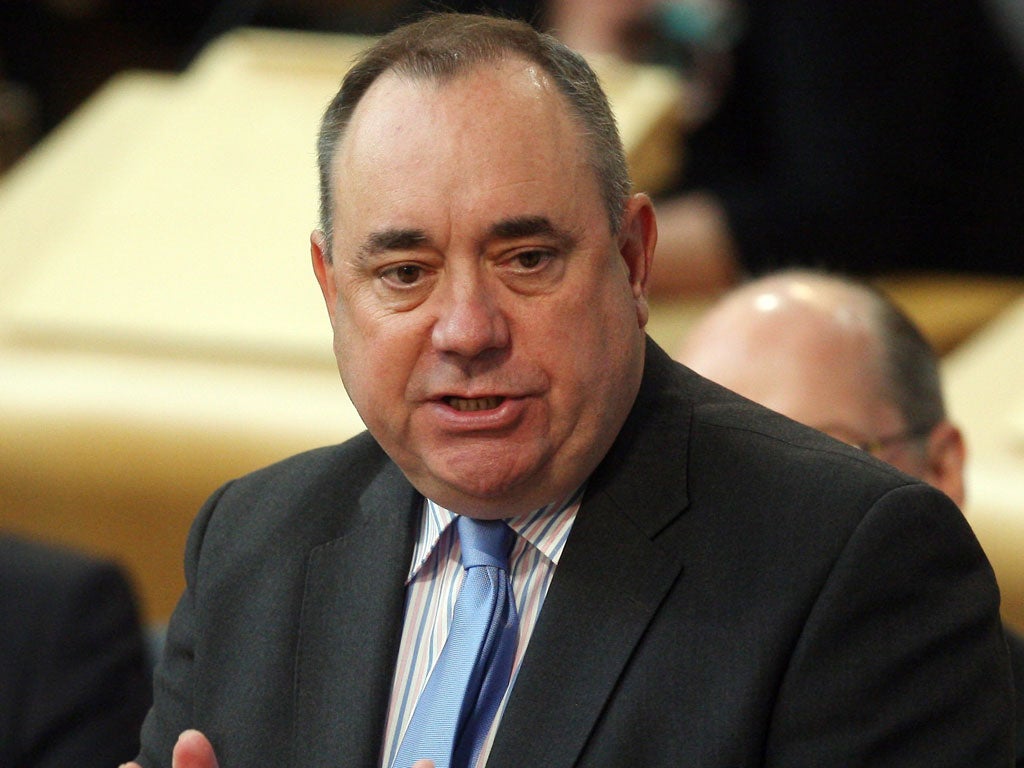Cameron and Salmond meet to seal deal
No 10 plays down attempts by Edinburgh to treat tomorrow's signing of referendum agreement as an 'international summit'

David Cameron has agreed an increase in the amount the two sides in the Scottish independence referendum will be able to spend during the campaign, as part of his deal with Scotland's First Minister, Alex Salmond.
The agreement to allow Scotland to vote on whether it stays in the United Kingdom, to be signed in Edinburgh tomorrow, is expected to impose a £1m spending limit on the "Yes" and "No" campaigns. Mr Salmond had originally proposed a limit of £750,000 for the two main "designated organisations".
After months of arm's-length dialogue, the Prime Minister will meet Mr Salmond at the seat of the Scottish government, St Andrew's House, tomorrow to agree the terms of an independence referendum, which is due to take place in two years' time.
But Mr Cameron will resist attempts to turn the occasion into an "international summit" designed to make him appear like a visiting dignitary – and head quickly back to London after signing the agreement and making a brief speech about the campaign ahead. Mr Salmond, meanwhile, intends to answer dozens of questions from the world's press.
The Independent on Sunday revealed last month that the governments in London and Edinburgh were finally close to agreement on the format of a referendum, which honours a pledge in the Scottish Nationalist Party (SNP) manifesto in the 2011 Scottish parliamentary elections.
However, UK government officials last night insisted that the "Section 30" authorisation will lapse if Mr Salmond fails to hold his referendum by the autumn of 2014.
The deal follows tortuous negotiations, during which the SNP was forced to agree that the referendum would have only one yes/no question, asking the electorate whether or not it wants Scotland to be independent. Mr Salmond had been pressing for a second question, on whether Scotland should be given further powers within the devolution settlement, but short of independence – the so-called "devo plus" or "devo max" options.
In return, the Scots are expected to be given the green light to lower the voting age from 18 to 16. The move, in line with the limit for Scottish health board elections, is viewed as a huge potential boost to the SNP, because younger voters are seen as less conservative than their older counterparts.
UK ministers maintain that the concession is limited, as it will only cover those young people who are already "pre-registered" to vote, because they will be 18 at the next general election in 2015 – meaning only those aged over 16 years and 10 months will be eligible to vote in the referendum. But critics have complained that it would be a "back door" method of lowering the voting age at all UK elections.
Despite the agreement, finally thrashed out by the Scotland Secretary, Michael Moore, and Mr Salmond's deputy, Nicola Sturgeon, on Friday, it was clear last night that Westminster and Edinburgh had different views on the wider implications of tomorrow's meeting.
Senior sources in Edinburgh have claimed the SNP leadership planned to present the signing of the "St Andrew's Accord" as a significant diplomatic occasion, giving the impression that Scotland was already an independent nation, with Mr Cameron adopting the role of a visiting leader. Mr Cameron will arrive in the city by car following a visit elsewhere, and will sit with Mr Salmond to sign the agreement.
However, while the PM will head back to London after making a brief statement, the First Minister will hold a press conference for dozens of journalists from the UK and overseas. "There will be no hostility," one official said. "Mr Cameron will be given a respectful welcome, like a state visit. He will be walking into a confident nation as a visitor, not a leader; like a foreigner in his own country."
But a coalition source said last night: "No one underestimates the significance of this referendum, but Mr Cameron is still the Prime Minister of all the UK – and Scotland is an important part of that."
Mr Moore said: "I am confident that the majority of Scots want to remain inside the UK family. They don't shout about it but they do believe in it."
Join our commenting forum
Join thought-provoking conversations, follow other Independent readers and see their replies
Comments